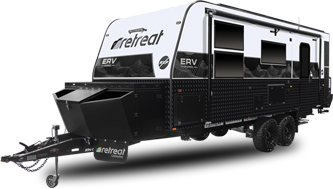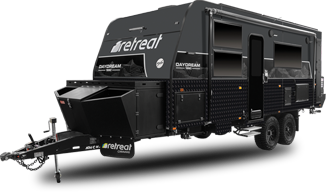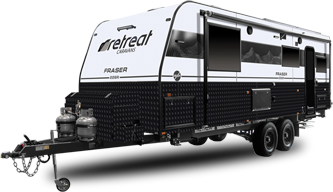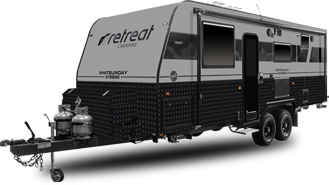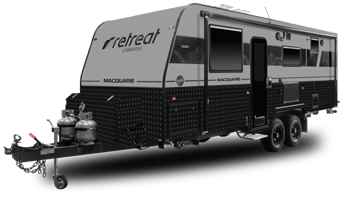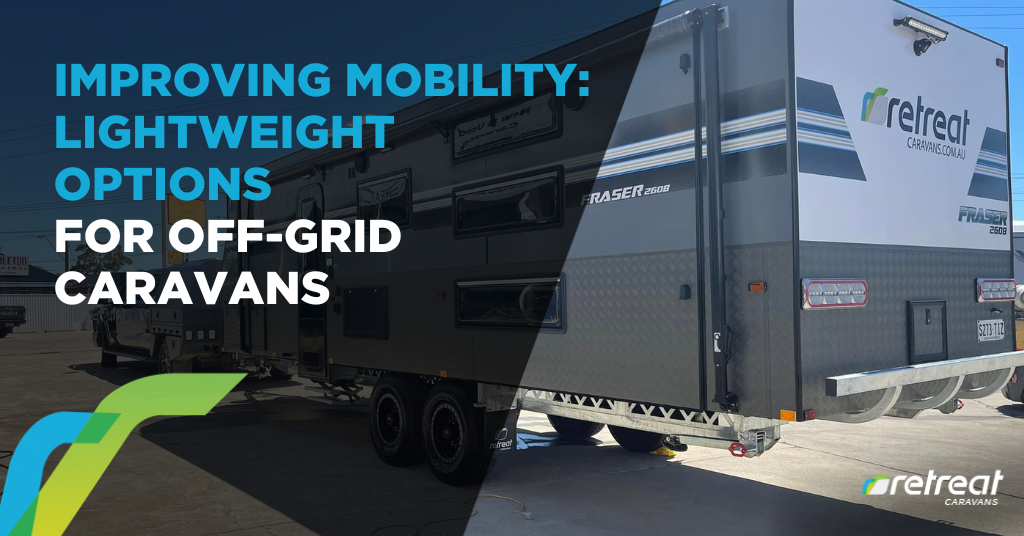
Improving Mobility: Lightweight Options for Off-Grid Adventures
When you head off the beaten track, how you move matters. Hauling too much gear can slow you down, burn more fuel, and wear out your setup. Whether you’re pulling luxury caravans through river crossings or loading up for a desert drive, keeping things light makes everything smoother.
Across Australia, more travellers are choosing life away from caravan parks and into the wild. Off-grid caravans now offer solar, water storage, and tough frames to handle the bush. But even with these setups, packing smarter gear that weighs less is key to moving freely and staying out longer.
Mobility is freedom. So let’s break down the tools, tricks, and tech that help you travel light and go further.
Portable Solar Power: Compact Charging, Big Results
Old solar systems were heavy and fixed. Today, foldable panels slip into a backpack. Brands like Bluetti, EcoFlow, and Redarc lead the charge with portable kits that weigh under 5kg and charge everything from fridges to drones.
A setup might include:
- Foldable blanket panels
- Smart charge controller
- 100Ah lithium battery
- Solar power station
This combo means no need for fuel-powered generators. It also means quiet nights and less stress about power. The lithium batteries alone save you serious weight compared to lead-acid ones, while offering faster charge times and more usable capacity.
In tough terrain, especially on rough tracks or long hauls, using the best suspension for off-road caravans makes all the difference in keeping everything stable and secure.
Collapsible Furniture: Sit, Sleep and Store with Less
Camp furniture used to be clunky and awkward. Now, there are full-size tables and chairs that weigh less than a kilo. Aluminium frames, tensioned fabrics, and roll-up designs make packing and setup faster without losing comfort.
Popular items include:
- Ultralight chairs with mesh backs
- Compact folding tables
- Soft lounges with air or foam support
- Roll-out kitchens with built-in storage
Even a full kitchen setup can fit in a single crate if packed right. What matters is how each piece works together. A small footprint makes for faster setups and more space inside your van.
When you’re setting up for a quick overnight near the Grampians or Wilsons Prom, these off-road caravanning tips for national parks near Melbourne offer smart ways to blend comfort with mobility.
Lightweight Cooking: Gear That Packs a Punch
Cooking off-grid doesn’t mean bringing a whole kitchen. With the right gear, you can boil, fry, and grill using tools that fit in a daypack.
Key pieces to consider:
- Titanium pots and pans
- Solid-fuel or gas stoves under 300g
- Compact coffee makers and grinders
- Stackable food containers
Jetboil systems and other stove kits boil water fast and pack into themselves. They work well for solo travellers or quick stops. For groups, nesting cookware sets save space while serving multiple people.
If you’re gearing up for an extended trip, having the right van is just as crucial as having the right frypan. This guide explains what to look for in a camping caravan when planning your long-term off-grid adventure.
Smart Storage: Modular, Stackable, Efficient
Organisation makes a big difference when space is limited. Using modular storage setups lets you pack more into less space — and access it faster.
Options worth using:
- Stackable crates with colour codes
- Soft cubes for clothing and kitchen items
- Roll-up tool bags
- Vacuum-seal dry food bags
Everything should have its place. Tools go near the rear door, food in an overhead bin, and clothes in labelled cubes. Dry bags help double as pillows or daypacks. The goal is simple: reduce digging and searching.
Inflatable Solutions: Bigger Isn’t Heavier
Inflatable gear now includes more than just mattresses. Full tents, paddleboards, and even lounges come in inflatable designs that weigh a fraction of solid versions.
Popular inflatable picks:
- Air-beam tents that set up in under 5 minutes
- Inflatable SUPs for lakes and rivers
- Roll-up solar showers
- Blow-up lounges that inflate without a pump
Good inflatables are durable and weather-tested. Carry a small repair kit just in case. Many models come with their own pump and pack into carry bags no bigger than a sleeping roll.
Lightweight Shelter: Compact, Tough, Reliable
Not every trip calls for a big van or full awning setup. If you’re trekking or doing solo overnights, go smaller.
Shelter types that travel light:
- Swags under 6kg with foam built in
- Bivy sacks for one-person stealth camping
- Hammock tents with mosquito nets
Some of the new swags use canvas that resists water and UV without adding bulk. For couples, lightweight hiking tents made with aluminium poles and silicon-coated rainflies offer both room and weather protection without tipping the scales.
Mobile Transport: E-Bikes and Beyond
Having extra wheels without the bulk can help you scout, explore or grab supplies. E-bikes and fat-tyre bikes are great for beach tracks, fire trails or quick town runs. Most fold down and fit inside or on the back of your van.
Also worth considering:
- Electric scooters with off-road tyres
- Compact folding bikes
- Trailers for gear hauling behind your bike
Charge them off your solar system, and you’ve got a clean way to get around without firing up the 4WD.
Hygiene and Waste: Clean Camp, Light Load
Hygiene is easy to overlook until it’s a problem. Compact gear now handles waste, washing and water with less mess and less weight.
Essentials include:
- Solar shower bags
- Folding toilet chairs with compost bags
- Eco-friendly soap and wipes
- Flat-pack wash basins
Pop-up shower tents fold down small and keep things private. For long trips, small composting toilets now fit under beds or slide-outs in newer vans. Keeping things clean also helps you stay out longer without needing to stop at facilities.
What’s Next in Lightweight Off-Grid Gear?
The future of mobile travel looks smarter and lighter. Expect to see:
- Solar skins built into tents and awnings
- Graphene-enhanced batteries for faster charging
- Carbon frames in trailers and camp gear
- AI energy monitors that adjust power use in real-time
Connectivity will also grow. Low-earth satellites now bring internet to remote spots, and more vans come ready for plug-and-play tech.
Sustainability’s playing a big role, too. New materials are recyclable or built from reused plastics and metals. You’ll see gear that lasts longer, breaks down smaller, and leaves less behind.
FAQs
1) Can lightweight gear hold up in harsh Aussie weather?
Yes, if it’s built for it. Many new materials are lighter but stronger than traditional ones. Aluminium alloys, coated canvas, and air-beam structures handle sun, rain and wind well. Inflatable tents, for example, are tested to 100km/h winds. Titanium cookware won’t rust or warp. Just avoid cheap knock-offs. Look for gear tested in similar conditions and always do a test setup at home before heading out.
2) How do I make sure I’m not overloading my caravan?
Weigh everything before packing. Start with your van’s tare and GVM. Factor in water, fuel, food, gear and passengers. Use lighter alternatives where possible — lithium instead of lead-acid, soft storage instead of plastic tubs, collapsible furniture instead of steel. Overloading stresses your suspension, affects fuel use and puts your safety at risk. Travel with only what you use.
3) What’s the most efficient way to manage power when off-grid?
Use solar panels during the day and lithium batteries to store extra power. Avoid running big appliances like kettles or toasters. Use low-watt fridges, LED lighting and DC-powered devices. Turn off anything you’re not using. A solar generator or inverter helps balance loads. Keep a backup power bank charged in case of emergencies.
4) How do I stay clean without full facilities?
Solar showers give warm water by late afternoon. Use quick-dry towels, rinse-off soaps, and biodegradable wipes. A small collapsible basin can double as a foot bath or sink. For longer trips, a foldable toilet and pop-up shower tent offer full privacy. Dry bags help you store dirty clothes and waste cleanly. Good hygiene is easier with routines — wash, rinse and dry at set times, and keep items in easy-to-reach kits.
5) What’s one piece of lightweight gear worth splurging on?
A good solar setup. Portable panels and lithium batteries pay for themselves. They reduce fuel use, noise, and stress. They let you stay off-grid longer and keep essentials powered. If your fridge works, your food lasts. If your battery’s full, your lights stay on. It’s peace of mind that weighs less than a jerry can.
Ready When You Are
Mobility shapes the way you explore. The lighter you travel, the more you see — with less stress and more time doing what you love. It’s not about roughing it. It’s about choosing gear that works harder without weighing you down.
If you’re serious about going off-grid and staying there longer, luxury caravans from Retreat Caravans are built with that purpose in mind. They combine tough exteriors, smart layouts, and lightweight options to make your travels easier. Explore their full line of off-grid caravans and get ready for the journey ahead. Let the road guide you — but let your gear keep you light.
See below for our full range of caravans, all carefully designed with you in mind:



